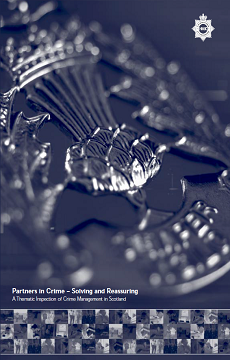This report is the result of a thematic review of crime management in Scottish policing. It reflects on incident handling, crime recording, investigation, police reporting, the use of technology, and the needs of victims. In some respects the recommendations may be seen as aspirational. They are certainly challenging in terms of prioritisation of resources. However, they offer a foundation for practical progress.
Number | Recommendation |
|---|---|
1 | Forces should publish a clear and concise attendance policy which retains an element of flexibility but details the level of service victims of crime can expect to receive on reporting a crime to the Police. |
2 | Forces should establish a Crime Management Unit either at divisional or force level staffed by the properly trained and equipped staff to facilitate the proper and professional investigation of crime, founded on a consistent allocation policy. |
3 | Forces review their current volume crime management policies and, if necessary, include guidance on minimum standards expected in the investigation of all crimes and confirm that every activity undertaken in respect of a crime investigation is formally recorded on the associated crime report. |
4 | Forces, within the overall resource equation ensure the fullest possible use of SOCO and Volume Crime Examiners and forensic scientists. |
5 | Forces have in place a competent and reliable method of recording the results of crime scene examinations. |
6 | Forces should adopt a strictly adhered to protocol in relation to SOCO attendance at volume crime scenes. |
7 | The recognition of analytical staff should be enhanced by: • Forces putting in place a career structure to ensure the continued recruitment and retention of properly qualified and trained analytical staff. • the setting up of a National Forum for analytical staff to allow for the sharing of good practice and dissemination of methodology. • the SPC reviewing its training package with respect to the training of analysts particularly in relation to using past data to inform future resource deployment. |
8 | Forces should look at ways of integrating their available IT systems to prevent duplication of work and thereby allowing analytical staff to provide maximum returns from the information available. |
9 | That sufficient priority is afforded to resourcing the intelligence function within forces to ensure that it is adequately staffed to allow for the effective implementation of the National Intelligence Model and its associated processes. |
10 | Forces audit their existing training and briefing process to ensure all officers are aware of the ethos of the NIM and the part they have to play in its successful implementation. |
11 | Forces should embrace more fully the concept of predictive analysis and put in place an IT system to provide a management information system which allows the analysis of past and emerging trends as a basis for anticipating likely future trends in crime. |
12 | Under the aegis of SPIS, ACPOS continues to review progress and opportunities with emerging developments including: • Single data capture • Exploitation of the e-portal, and • The potential of mobile data. |
13 | That Chief Constables implement the following processes with regards repeat victims: • review their in-force arrangements for identifying all repeat victims at the earliest possible point and preferably before first face to face contact with a police officer • where necessary, exploit best practice available elsewhere • carry out a review of policies in respect of action to be taken when a repeat victim is Identified. |
14 | Forces review the mechanisms by which victim information needs are identified, recorded, delivered and monitored. |
15 | ACPOS considers the development of a standard chapter relative to victim issues be incorporated, within an appropriate timescale, within the crime reports utilised by each Scottish force. |
16 | Forces significantly increase the number of referrals to VSS in respect of people adversely affected by crime. |
17 | ACPOS in liaison with COPFS review how respective responsibilities might be addressed in relation to how victims of volume crimes including housebreaking and car crime receive progress reports relative to their particular case once the case is forwarded to COPFS. |
18 | The Scottish Executive and ACPOS review where ISCJIS sits within the wider criminal justice strategy and look at the existing ISCJIS protocols to establish if they reflect the priorities of such a strategy. |


